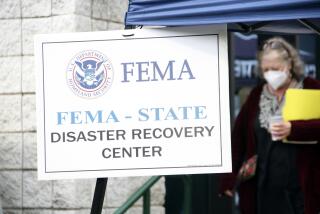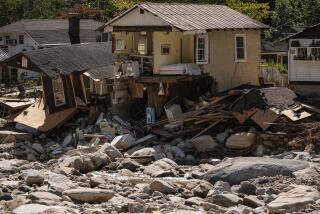FEMA using lessons from Katrina to deal with Tropical Storm Isaac
WASHINGTON -- Seven years after Hurricane Katrina slammed into the Gulf Coast, federal officials say they are embracing the most important lesson they learned from that catastrophe as they brace for Tropical Storm Isaac: collaborate, early and often.
“The biggest lesson we’ve learned is that we have to work together as a team at the state and federal level,” Craig Fugate, director of the Federal Emergency Management Agency, told reporters during a conference call Monday.
“We’ve learned those lessons,” he said, “to not wait to start talking to each other.”
Federal officials have been in touch with governors, mayors and emergency management officials along the Gulf Coast, Fugate said, and are sending management teams to cities and towns in the expected path of the storm to help local authorities prepare and respond.
The agency is moving vast stores of emergency supplies -- water, food, cots and blankets -- to the portion of coastline where the storm is expected to roar ashore, he said. In 2005, emergency officials were caught short on infant formula and other supplies for children, so this time more is being sent, he said.
PHOTOS: Preparations for the GOP convention
Wednesday marks seven years since Katrina devastated parts of New Orleans and tore up a broad swath of Mississippi and Alabama. It also marked what many saw as a failure of the George W. Bush administration, which was widely viewed as slow to respond to one of the most destructive hurricanes in U.S. history. Bush’s popularity never recovered.
This time, the Obama administration has taken care to keep local officials and media fully briefed on preparations, and to show the president as fully engaged.
The White House has discussed its efforts since the middle of last week, when aides reported that Obama was meeting with FEMA officials as Isaac appeared headed for the eastern Caribbean. FEMA was then coordinating with local officials and emergency managers in Puerto Rico and the U.S. Virgin Islands and sending liaisons to their emergency operation centers.
Even before it was clear Isaac might pose a threat to the U.S. coastline, FEMA’s regional offices were in touch with officials in Southeastern states to coordinate preparations. Each day since, the administration has updating reporters on the preparations -- and on the president’s level of attention. President Obama is getting daily briefings and updates when needed, aides say.
In an unusual plea before ending his conference call, Fugate implored journalists to stop fixating on New Orleans, because Alabama, Mississippi and other parts of the Louisiana coastline could bear as much or more of the storm’s impact.
“Everybody’s focusing on New Orleans,” he said, “and they don’t understand this threat is not a point. It’s a large area.”
For Obama, though, avoiding a repeat of the New Orleans experience is precisely the point.
Follow Politics Now on Twitter and Facebook
More to Read
Sign up for Essential California
The most important California stories and recommendations in your inbox every morning.
You may occasionally receive promotional content from the Los Angeles Times.











